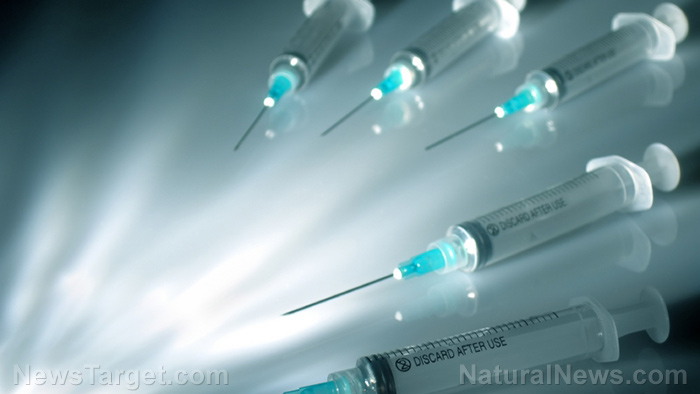Florida surgeon general supports commonsense COVID prevention strategies such as vitamin D and superfoods
12/17/2021 / By Mary Villareal

Dr. Joseph Ladapo, Florida surgeon general and secretary of the Florida Department of Health, issued a statewide public service announcement supporting commonsense Wuhan coronavirus (COVID-19) prevention strategies, including optimizing vitamin D levels, staying active, eating nutrient-dense food and boosting the immune system with supplements.
Florida’s Health Department also highlighted emerging treatments for COVID, such as fluvoxamine and inhaled budesonide. Fluvoxamine is an antidepressant pill, while inhaled budesonide is commonly used for asthma patients.
The department stated that physicians should now use their clinical judgment when recommending treatment options for patients’ health care needs, and may include emerging treatment options so long as there is appropriate informed consent of patients.
The evidence of vitamin D against COVID satisfies the criteria for causality in a biological system, with dozens of studies having been demonstrated that it helps reduce all risks associated with the disease.
The HealthierYouFL.org website has been urging Floridians to talk to their health care providers about how certain supplements or foods containing vitamins and minerals might help boost the immune system. These vitamins and minerals include zinc, vitamin D, vitamin C and quercetin, which are all known to have shown a positive impact on mitigating COVID-19 risks.
Vitamin D important for immune function
As early as September 2020, data from 14 observational studies showed that vitamin D blood levels are inversely correlated with the incidence or severity of COVID.
The body is well-equipped to handle infections, provided the immune system is working properly. Vitamin D receptors are found in large numbers of different tissues and cells, including immune cells. Meaning, vitamin D plays an important role in immune function.
The lack of vitamin D will impair the immune system, which makes people more susceptible to infections, including COVID-19.
Having sufficient vitamin D in the system can reduce the risk of COVID-19 and other respiratory infections through different mechanisms, such as reducing the survival of viruses and inhibiting their replication. It also reduces inflammatory cytokine production and maintains endothelial integrity. Endothelial dysfunction contributes to vascular inflammation and impaired blood clotting, which are hallmarks of severe COVID-19.
Vitamin D also boosts the overall immune function by modulating innate and adaptive immune responses, reducing respiratory distress and improving overall lung function. It also helps produce surfactants in the lungs that help in fluid clearance. Vitamin D optimization is one of the easiest and least expensive impactful strategies to reduce the risk of COVID and other respiratory infections.
Further, vitamin D mitigates COVID risks. An observational study looked at data for 191,779 American patients. Around 12 percent of those with vitamin D levels below 20 nanograms per milliliter (vitamin D deficient) have shown positive tests for the SARS-CoV-2 virus, compared to only 5.9 percent of those with optimal vitamin D levels. (Related: Top ICU doctor suspended after suing hospital for banning life-saving COVID treatments.)
SARS-CoV-2-specific investigations also found that COVID-19 is far more common in vitamin D deficient individuals. In one study, 82.2 percent of COVID patients were vitamin D deficient, compared to 47.2 of population-based controls.
Researchers also found that blood levels of vitamin D inversely correlate to D-dimer levels, which measure blood coagulation. Many patients have elevated D-dimer levels, which are associated with blood clots. This was particularly true with the first strain of the virus but less common with subsequent variants.
Data also showed that the vitamin D blood levels are inversely correlated with the incidence or severity of COVID-19, which is logical as it regulates inflammatory cytokine production – a lethal hallmark of the virus and an important regulator of the immune system.
Finally, vitamin D reduces the severity that could translate for a lower risk for hospitalization. A Spanish study found that baseline vitamin D levels inversely correlate with the risk of ICU admissions and that giving supplemental vitamin D3 on the first day of admissions of hospitalized patients reduced ICU admissions by 82 percent.
Watch the video below to learn more benefits of vitamin D.
Read more articles about COVID-19 prevention strategies at Pandemic.news.
Sources include:
Submit a correction >>
Tagged Under:
alternative medicine, coronavirus, covid-19, immune system, infections, medical freedom, nutrients, outbreak, pandemic, prevention, research, supplements, vitamin D
This article may contain statements that reflect the opinion of the author
RECENT NEWS & ARTICLES
Pandemic.News is a fact-based public education website published by Pandemic News Features, LLC.
All content copyright © 2018 by Pandemic News Features, LLC.
Contact Us with Tips or Corrections
All trademarks, registered trademarks and servicemarks mentioned on this site are the property of their respective owners.



















